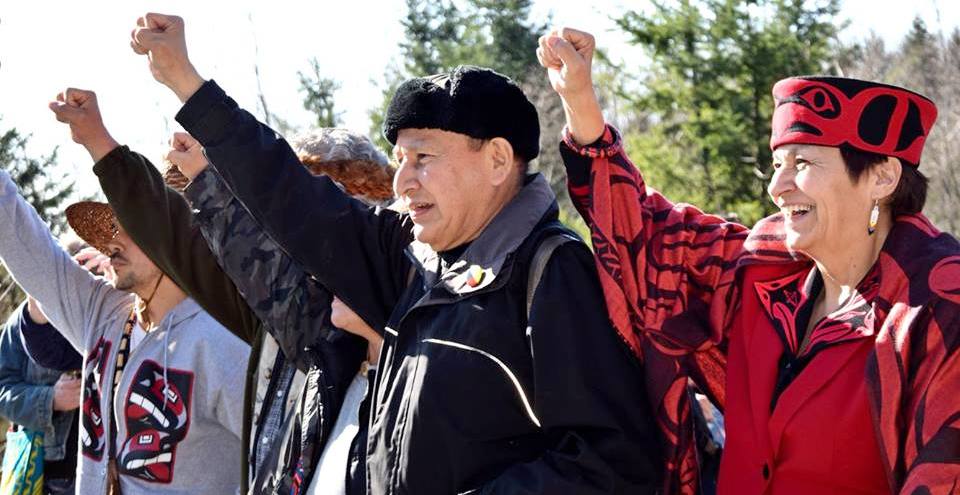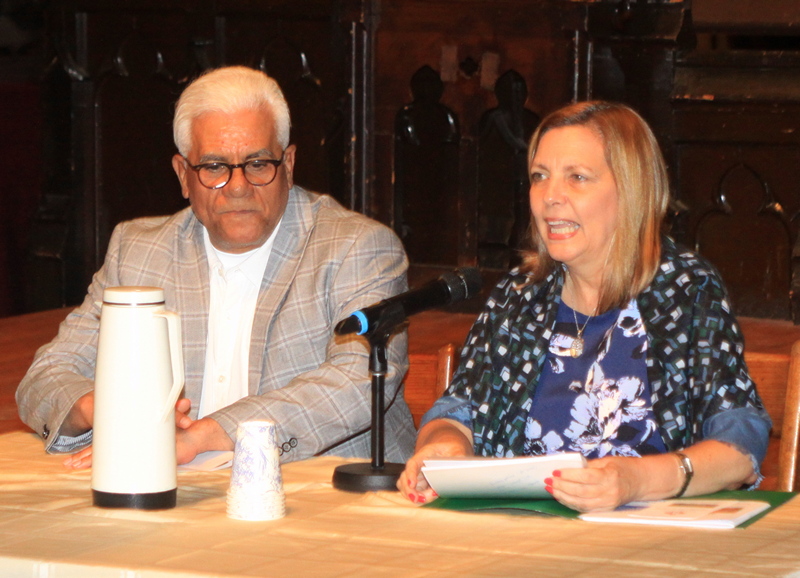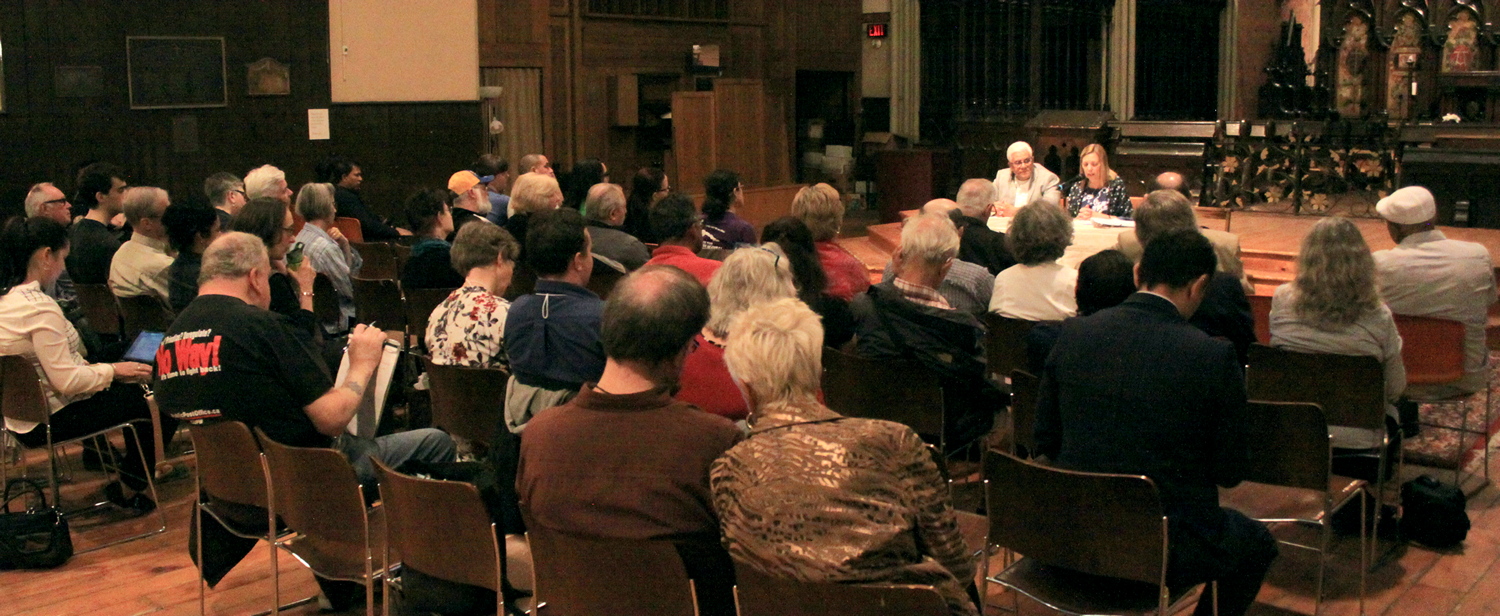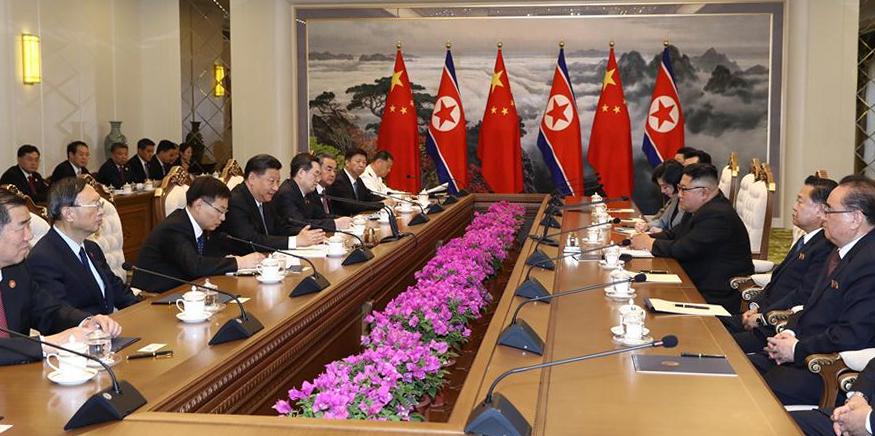
|
June 22, 2019 - No. 23 Free Trade and Trans Mountain Pipeline Pipeline Expansion
Raises Serious
Questions About Direction of the
|
|
|
"This decision is disappointing, but not a surprise. Tsleil-Waututh again engaged in consultation in good faith, but it was clear that the federal government had already made up their mind as the owners of the project," said Chief Leah George-Wilson of Tsleil-Waututh Nation. "Unfortunately, this feels too familiar -- Canada repeated many of the same mistakes from last time. We will review the decision carefully with our team, and we will consider our legal options to ensure our rights are protected."
"The Title and Rights holders of our Indigenous Nations have not provided their consent," said Kukpi7 Judy Wilson, Chief of the Neskonlith Indian Band and Secretary-Treasurer of the Union of BC Indian Chiefs (UBCIC). "The approvals of Indian Band Governments, under financial duress, do not meet the standards of a nation-to-nation relationship. Until such a time that our right to free, prior and informed consent are recognized and implemented, as set out in the human rights standards of the United Nations Declaration on the Rights of Indigneous Peoples, we will continue to oppose these projects and stand in defence of our lands.
"Our lands are burning and flooding. Our fish are dying and our people are suffering. Now is not the time to recklessly pursue environmentally devastating projects while our territories suffer," said Grand Chief Stewart Phillip, President of the UBCIC. "We will actively and continuously resist the pursuit of short-term gains, in order to ensure the quality of life and the well-being of our children and our children's children. We are immensely disappointed by today's announcement, but we are also prepared. We do not accept Canada's pre-meditated decision, and we are prepared to continue to oppose this project through any means possible."
Khelsilem, Squamish Nation Spokesperson, stated, "The Squamish Nation met with federal officials as they conducted their court-ordered Phase III consultations with First Nations. What we experienced was a shallow attempt at consultation that resulted in a failure to address our concerns. The failure to meaningfully engage with rights holders means this government is either not serious about building this pipeline or not serious about respecting Indigenous rights."
(June 18, 2019. Photos: Coast Protectors, UBCIC.)
Ninth Biennial Convention of the Canadian Network on Cuba
Defending
Canada-Cuba Ties of
Friendship and Solidarity
On June 8-9, 2019 delegates of 19 Canada-Cuba solidarity and friendship organizations from across the country gathered at Toronto City Hall for the 9th Biennial Convention of the Canadian Network on Cuba (CNC). Delegates met in the context of Washington's escalating attacks on Cuba and worrying developments in Canada-Cuba relations. The closing of Canada's visa office in Havana, for example, was highlighted as extremely perturbing. Delegate deliberations emphasized that for 2019-2021 one of the central tasks facing the CNC, therefore, is to do its utmost to reverse these negative developments and ensure Ottawa's policy towards Cuba does not mirror Washington's. The Convention underscored that Canadians, who in their hundreds of thousands visit Cuba annually for many reasons including tourism, business, academic, political and cultural exchanges of all kinds, want Ottawa to pursue a foreign policy based on mutual respect and equality.
Heroic Island Faces the Empire
On June 7, a pre-convention event was held at A
Different
Booklist, where speakers Cuban Consul Yoslaidy Clemente López,
Cikiah Thomas (Chairperson, Global Afrikan Congress) and Dr.
Isaac Saney (Cuba specialist, CNC Co-Chair and Spokesperson)
addressed a packed house. Clemente López said Cuba's history has
been one of resisting and standing up to colonizers and imperial
powers and that the Cuban people would prevail over whatever the
U.S. decided to hit them with. In their presentations Saney and
Thomas soberly but passionately denounced Washington's and
Ottawa's aggression against Cuba and Venezuela. With the meeting
serving as the kick-off for the CNC Convention, the presenters
called on all Canadians to uphold the right of self-determination
and sovereignty of all peoples, while opposing the meddling and
interference of any external force in their countries.
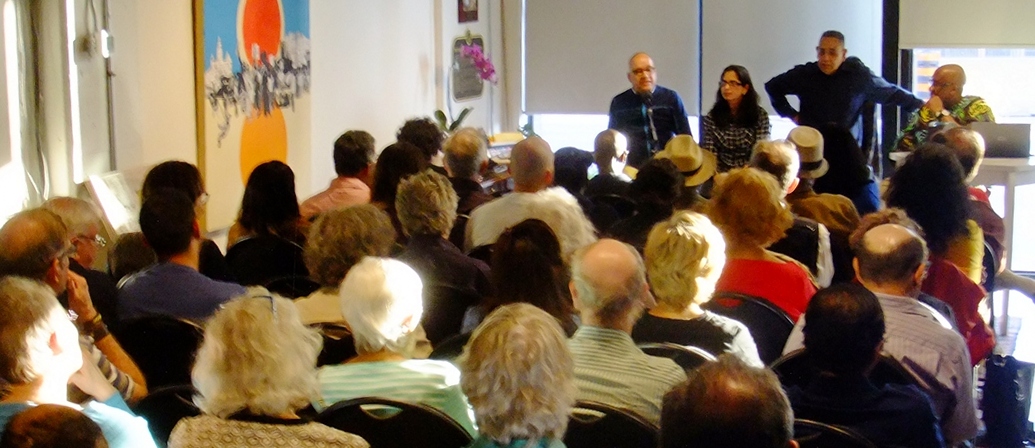
Event at A Different Booklist on June 7, 2019, entitled "Cuba in the
Time of Trump:
An Island Against the Empire."
On the morning of June 8, the 9th Biennial Convention opened by acknowledging and greeting guests from the Embassy of Cuba in Canada and the Cuban Institute for Friendship with the Peoples (ICAP). Chief Stacey Laforme of the Mississaugas of the New Credit First Nation then brought greetings. With a moving message of unity, Chief Laforme stressed the commonalities that bind all peoples together. As a token of gratitude, Chief Laforme was presented with a pouch of Cuban tobacco by CNC Co-Chair Isaac Saney. Saney underlined the symbolism of the Cuban tobacco by reciting the story of Hatuey, the Taino chief from Haiti who led the resistance in Cuba to Spanish colonization. Hatuey is recognized by Cubans as the island nation's first internationalist. Saney also highlighted Havana's important diplomatic contribution to the United Nations Declaration on the Rights of Indigenous Peoples.
|
|
Distinguished guests included Her Excellency Josefina
Vidal
(Ambassador of Cuba to Canada), Tania López Larroque (Consul
General of Cuba in Toronto), Sandra Ramírez Rodríguez
(Director,
North
American Desk-ICAP), Yamil Martínez Marrero (Canada Desk-ICAP)
and other Cuban diplomats and guests. The Convention then had the
distinct honour and privilege of receiving words of greetings
from Ambassador Josefina Vidal. The Ambassador underlined the
importance of the Canada-Cuba solidarity and friendship movement.
She emphasized that despite facing ongoing U.S. aggression, the
Cuban people had preserved their unity, without violating any of
the revolutionary or ethical principles that have guided Cuba's
socialist project. She stated that Cuba's goal was to continue to
build a society of ever greater equity and justice, guided by
José Martí's vision of a nation "with all and for all."
The
Ambassador reiterated these points in the June 8 evening public
meeting, Cuba Moving Forward in 2019, held at the Church of the
Holy Trinity, located in Trinity Square. She elaborated on the
island nation's socioeconomic development and the new
constitution, emphasizing Cuba's determination to renew its
revolutionary and nation-building project, while preserving its
independence and sovereignty. She underscored the extensive
democratic participation of the Cuban people in this process. In
a lively question and answer period, Ambassador Vidal
unequivocally declared that Cuba stands for Latin American
independence, is opposed to foreign interference and intervention
in the region, and will not yield to imperial pressure. She said
that the Canadian government should reconsider its decision to
close its visa office in Havana, so that it would not be
remembered as the government that ended Canada-Cuba people-to-people
relations.
Delegates attended from almost all the Canadian Network on Cuba member groups from Halifax to Vancouver. A report on the CNC work over the last two years was presented by co-chairs, Isaac Saney and Elizabeth Hill, followed with verbal reports from member organizations. In addition to plenary sessions and public events, three Convention panels were also held. In the first panel, on Canada-Cuba-U.S. relations, Sandra Ramírez and Isaac Saney addressed Canada's closing of its visa processing facilities in its Havana embassy and its impact on the Canadian and Cuban people. There was also an extensive discussion of Washington's aggression against Venezuela and the impact on Cuba and Canada of the activation by U.S. President Trump of Title III and IV of the notorious and internationally condemned Helms-Burton Act. On the second panel, Defend Cuba and Latin American Sovereignty and Independence, Yamil Martínez (ICAP), Edgar Godoy (Latin American and Caribbean Solidarity Network) and Dr. Maria Páez Victor, (Chair, Canadian, Latin American and Caribbean Policy Centre) underscored the historic meaning of the Cuban Revolution for the cause of democracy, sovereignty and peace in the region. The dangers of U.S. imperialism, especially its ongoing attacks on Venezuela, which Canada has also joined, were examined in sobering detail.
The third panel featured a special guest speaker, Mark Entwistle, former Ambassador of Canada to Cuba from 1993-1997. Trained as an historian, Mr. Entwistle drew attention to the early history of Canada-Cuba relations going back to the late 19th century before reviewing the uninterrupted diplomatic relations that Canada and Cuba have enjoyed since 1945. He accentuated that Canada, along with Mexico, refused to break diplomatic relations with Cuba in the 1960s when the United States established its economic, financial and commercial blockade of the island nation. He stressed that the recent closing of the visa office represents a serious departure from this longstanding relationship. He underscored that Cuba has a unique perspective on the world and has played an important role in contributing to regional peace and security. In the question and answer period, Mr. Entwistle emphasized that Canada's relationship with Cuba is important but that due to current developments Canada's image is at risk of being harmed in the eyes of the Cuban people.
Over the course of the convention delegates reaffirmed
their
determination to strengthen the Canada-Cuba solidarity movement
and defeat the U.S. all-sided economic blockade of Cuba.
Delegates also expressed their deep concern over the current
state of Canada-Cuba relations, resolving to do their utmost to
ensure that relations remain based on the international norms of
mutual respect and equality between nations. Therefore, given the
escalation of the U.S. economic war against Cuba and the current
uncertainty in Ottawa's relations with Havana, a number of
resolutions were adopted to guide the work of the CNC during
2019-2021.
Measures were adopted to stabilize and grow the Ernesto Che Guevara Volunteer Work Brigade in order to ensure its future success. Carrying on the fight against the U.S. economic blockade of Cuba, delegates adopted a resolution against the activation of Titles III & IV of the Helms-Burton Act aimed at mobilizing Canadian public and political opinion against the unabated U.S. policy of aggression against Cuba. Apprehensive about the present state of Canada-Cuba relations, they also passed a resolution calling on Ottawa to reopen visa services in the Canadian embassy in Havana. Among other resolutions adopted were those calling for actions to mark the 5th anniversary of the liberation of the Five Cuban Heroes and the 500th anniversary of the founding of the city of Havana. Additionally, resolutions were passed to support the following conferences: 8th Vancouver Che Guevara Conference, in Vancouver, October 25-27, 2019; Hemispheric Anti-Imperialist Solidarity Conference for Democracy and Against Neo-Liberalism in Havana, November 1-3, 2019; and Cuba at 60: Current Challenges, Future Prospects, in Halifax, October 31-November 2, 2019. Delegates also reiterated the necessity to continue to strengthen the work with Members of Parliament and legislatures.
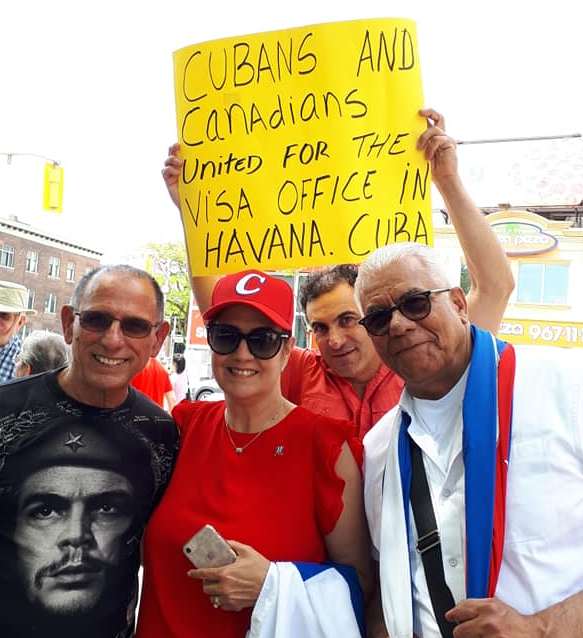 To pursue this mandate and
initiatives a new
seven-member
executive was elected: Bronwyn Cragg, Nora Fernandez, Julio
Fonseca, Tamara Hansen, Elizabeth Hill, Michael O'Neill and Isaac
Saney. The CNC embarks on the next two years with the task of
expanding solidarity and friendship with Cuba throughout Canadian
society. The CNC reaffirms that the people of Cuba, whatever the
changes in Ottawa's relations with Havana, can continue to count
on the ongoing and undiminished solidarity and friendship of the
people of Canada. This solidarity and friendship are neither
tenuous nor transitory but spring from the deeply rooted respect
and admiration of Canadians for Cuba's historic realization of
its right to independence and self-determination, respect and
admiration amplified by what the Cuban people have been able
to achieve while facing unceasing aggression from the United
States. Out of this respect and admiration, unbreakable ties of
solidarity and friendship have been -- and continue to be --
forged between the peoples of Canada and Cuba.
To pursue this mandate and
initiatives a new
seven-member
executive was elected: Bronwyn Cragg, Nora Fernandez, Julio
Fonseca, Tamara Hansen, Elizabeth Hill, Michael O'Neill and Isaac
Saney. The CNC embarks on the next two years with the task of
expanding solidarity and friendship with Cuba throughout Canadian
society. The CNC reaffirms that the people of Cuba, whatever the
changes in Ottawa's relations with Havana, can continue to count
on the ongoing and undiminished solidarity and friendship of the
people of Canada. This solidarity and friendship are neither
tenuous nor transitory but spring from the deeply rooted respect
and admiration of Canadians for Cuba's historic realization of
its right to independence and self-determination, respect and
admiration amplified by what the Cuban people have been able
to achieve while facing unceasing aggression from the United
States. Out of this respect and admiration, unbreakable ties of
solidarity and friendship have been -- and continue to be --
forged between the peoples of Canada and Cuba.
For information:
Co-Chairs: Isaac Saney and Elizabeth
Hill
cnc@canadiannetworkoncuba.ca
National Spokesperson: Isaac Saney
902-449-4967,
isaney@hotmail.com
www.canadiannetworkoncuba.ca

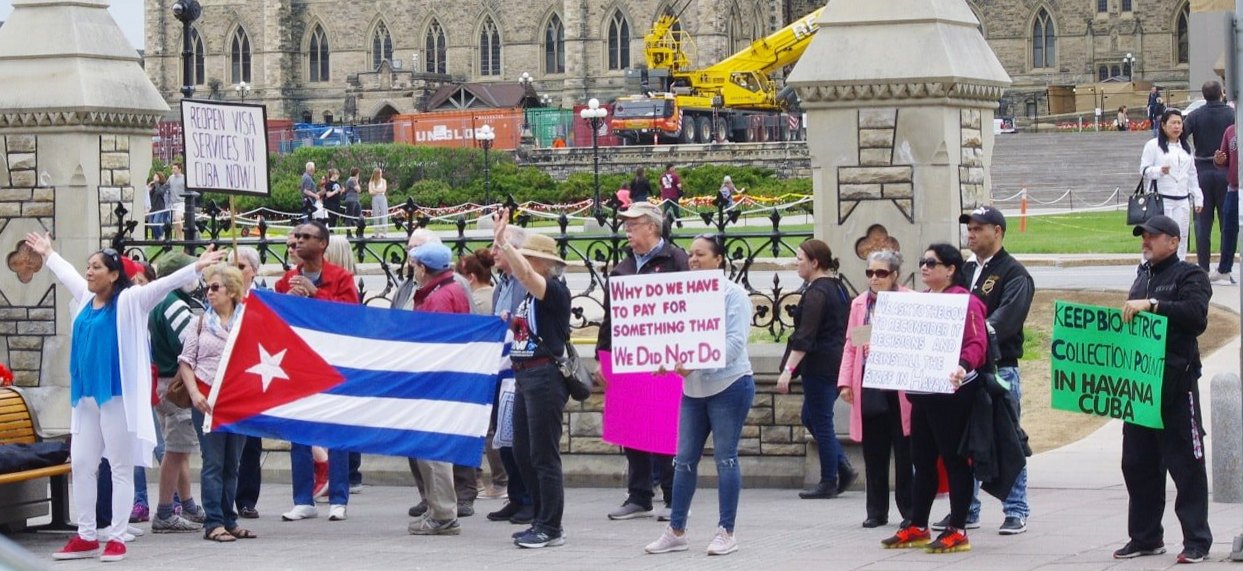

Actions on June 9, 2019 demand that Canada reopen consular services at
its embassy in Havana. Top to bottom: Montreal, Ottawa, Toronto.
(Photos: TML, Cuban Embassy, CNC, Association of Cuban Residents in Canada.)
Heroic Resistance in Honduras
Ten Years after the 2009 Coup d'État
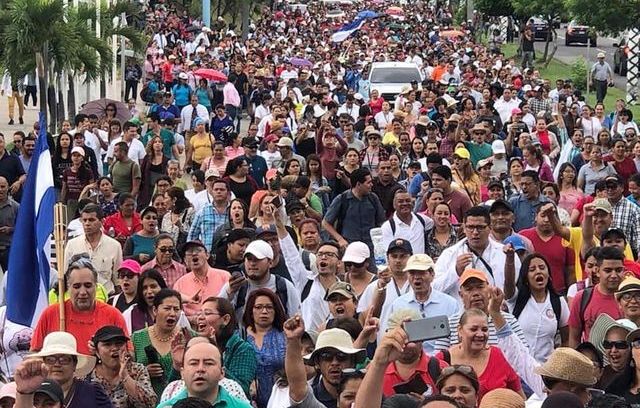
Tegucigalpa, Honduras, May 27, 2019.
June 28 will mark ten years since the democratically elected president of Honduras, Manuel Zelaya, was kidnapped and forcibly removed from office and from Honduras in a U.S.-orchestrated military coup d'état. Zelaya has said the main impetus for the coup was his government signing on to the Bolivarian Alliance for the Peoples of our America (ALBA) in 2008 -- something the U.S. could not tolerate. ALBA had been founded four years earlier by Venezuela and Cuba as an alternative to the Free Trade Area of the Americas being pushed at the time by the U.S. The coup forces quickly installed their own de facto president. A few months later through a fraudulent election that was boycotted by the majority of Hondurans and carried out under conditions of state terror aimed at suppressing the people's resistance to the coup, a representative of the National Party, entrusted by the U.S. with implementing its neo-liberal agenda in the country, was brought to power. Two electoral coups followed -- in 2013 and 2017 -- putting current president Juan Orlando Hernández of the same party in office, then handing him an illegal second term. Despite ample evidence of fraud, especially during the November 2017 election, the results were quickly accepted by the U.S. and Canada. This ensured that the Honduran people would once again be prevented from electing a government of their choice and would have one imposed on them by foreign interests, mainly U.S., intent only on plundering the country's natural and human resources and using it as a strategic military base to threaten and carry out aggression against the sovereign nations and peoples of the region.
In spite of the perfidy of the last ten years, the
people of Honduras have never resigned themselves to the fate assigned
to them by the rancid oligarchy of their country and the foreign
masters they serve. Following the coup, the people's forces immediately
mobilized and organized themselves in opposition to it, and have
remained in action ever since, forcefully asserting their rights under
the most difficult of circumstances -- deteriorating living conditions,
with 65 per cent of the population now living in poverty and 40 per
cent in extreme poverty, the systematic violation of human rights,
insecurity from the terror of targeted and random assassinations, the
militarization of their country and violent repression for daring to
oppose the neo-liberal dictate of the coup governments.
The last ten years have also seen the concession of territories to
foreign mining companies, the concession of rivers for extractive and
hydroelectric projects of national and foreign capital, eviction of the
Indigenous Garifuna people from their ancestral lands to open up new
areas on the Caribbean coast to the tourism market, bankrupting of
state enterprises and their subsequent privatization (telephony,
electricity, water, ports and airports, hospitals and clinics, with
banking groups buying up many of the former public health care
facilities). With the Free Trade Agreement Canada signed with Honduras
in 2012, Canadian companies are among those that have cashed in on this
agenda facilitated by the successive coups.
The rallying cry that since the stolen election in 2017 has come to
symbolize the people's rejection of all this and their determination to
get rid of the illegitimate president who helped deliver it is "Fuera
JOH!" (Juan Orlando Hernández, Out!).
As the tenth anniversary of the coup approaches, the people's resistance and fight for their democratic rights has gained steam and broadened, taking on important new dimensions. One of the forms this is taking is a sharp fight being waged by doctors and teachers in defence of the people's right to public health care and education. For almost two months now, unions representing doctors and teachers working in the public health and education systems, organized as the Platform for the Defence of Public Health Care and Education, have engaged in a nationwide strike initiated in opposition to decrees passed by the government calling for the "restructuring and transformation" of the national health and education systems -- understood to mean the privatization of both.
The teachers and doctors have been joined in the streets
and outside schools around the country by students, parents, private
school teachers, nurses and other hospital workers, taxi drivers,
transport truck operators and many others to demand the government
address their concerns. For periods of time during the past week the
country has been reported to be paralyzed, with roads blocked and
transportation and commerce of all types halted. The response of the
government has been to order the police, and increasingly the military,
to attack the demonstrations with tear gas and fire live ammunition at
people to force them to disperse. Several young people are reported to
have died from bullet wounds, with more than 20 being injured since the
strike began. The persecution of leaders of the movement has increased
with Twitter and Facebook closing down accounts and spreading lies
about their whereabouts so as to disorient the resistance movement
which is gaining momentum.
While continuing to back up their demands with strike
action, organizations that make up the Platform have taken their
political fight in defence of public health care and education to a new
level. On June 18, they held the inaugural session of an Alternative
Citizen's Dialogue on Public Health Care and Education, which they
convoked to involve not only members of the teaching and medical
professions, but students and parents, patients and community members
generally to join in discussing and designing a comprehensive plan to
improve the national health and education systems which they say are
grossly underfunded and have been allowed to deteriorate to an extent
that is deplorable. Hundreds of people showed up at the Medical College
of Honduras, which hosted the event. Organizers consider it to have
been a resounding success. Invited national and international experts,
diplomats and two deputy ministers sent by the government as well as
social movements from around the country were among the overflow crowd
in attendance. Earlier, the Platform had rejected a government attempt
to split their ranks by holding a "dialogue" and signing an agreement
with a hand-picked group of doctors and teachers but not
representatives of the Platform's leadership. Speaking at the inaugural
event, President of the Medical College and Platform Coordinator Dr.
Suyapa Figueroa said the fight of doctors and teachers was a fight of
the people of Honduras, arising out of their actions to demand health
care and education as basic rights, instead of commodities in the
marketplace, which she said they had become under the existing corrupt,
outsourced system.

Inaugural session of the Alternative Citizen's Dialogue on Public
Health and Education initiated
June 18, 2019, to counter the government's undemocratic "dialogue."
The Platform has announced that the Alternative Citizen's Dialogue will continue for at least five weeks, with members organizing discussions at schools, hospitals and clinics in all parts of the country, after which a report with the findings will be released. It has also announced a set of demands, including that any future dialogue with the government must involve all the Platform's organizations and be transmitted live on television and other media. Others are that military and police forces immediately be withdrawn from those communities where they have been repressing community members defending their right to health care and education, and that there be an impartial investigation to determine those responsible for the deaths, injuries and damages committed by state security forces in the course of carrying out these repressive actions. Shouts from the audience of The People United Will Never Be Defeated! and Fuera JOH! punctuated what Dr. Figueroa said as well as the speeches of other spokespersons.
The context in which all of this is occurring is one
that favours the people, if they continue to stick to their just
demands and organize to realize them by uniting in action to put an end
to the dictatorship and its anti-national, anti-people agenda, keeping
the initiative in their own hands. Juan Orlando Hernández, who
is becoming more unpopular by the day and has to rely on the repressive
forces at his command and the military might of the U.S. to keep him in
power, is being abandoned even by some of his traditional backers and
members of his fractured National Party. There is even speculation
about a coup against him being in the works to prevent the people's
forces from winning important victories and taking revolutionary action
to assert their sovereignty and remove Honduras from the clutches of
imperialism. Whatever the case, the people have learned to be wary of
any notions that the solution to their problems will come from anyone
or any force that is not under their control and accountable to them.
This is bound to stand them in good stead as they press ahead with the
fight to empower themselves and realize their goal of becoming the
masters of their own destiny in a new and sovereign Honduras – a
Honduras whose people no longer have to flee their homeland as migrants
and refugees in search of safety and the chance to make a living, and
that no longer serves as a base for foreign aggression in the region
but contributes to making Latin America and the Caribbean a zone of
peace.
(With files from El Libertador, El Pulso, TeleSUR. Photos: T. Diaz Galeas, M.U. Fajarda)
A Trade Union,
Political and
Insurrectional Struggle
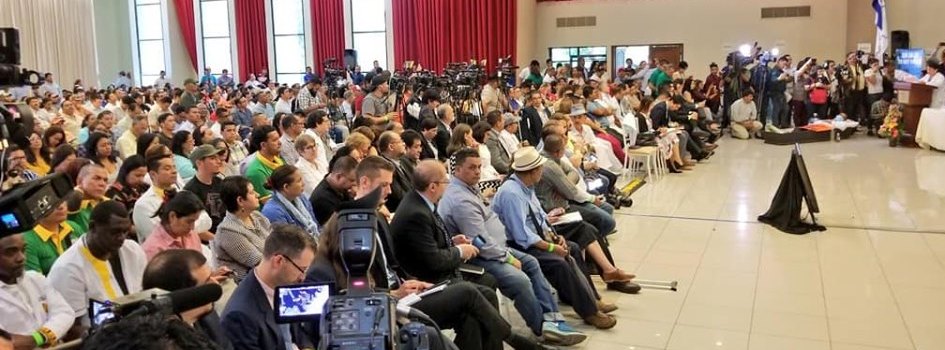
Inaugural session of the Alternative Citizen's Dialogue on Public
Health Care and Education held June 18, 2019 in Tegucigalpa, Honduras.
The medical and teachers' unions, which were in danger of massive layoffs and budget cuts due to the pressure of fiscal adjustments by the International Monetary Fund since its visit to Honduras in March, have managed to take back the streets by demanding the repeal of the restructuring decrees in the health and education sectors. In the middle of April, the presence of both unions in the streets, accompanied by university students and the conscious citizenry, had an impact.
After the protests on April 29 and 30, the restructuring decrees had to be withdrawn by their movers: the President of the National Congress himself, Mauricio Oliva, who the day before had mocked the Opposition with his sarcastic laughter in the House, had to very soberly announce his defeat. According to some analysts, it was a double defeat for Oliva because he made himself out to be the good pupil of the IMF to demonstrate his servility to the interests behind the international financial bodies, a sine qua non of those who aspire to a presidential candidacy for parties representing the elite.
The unions united in the Platform for the Defence of Public Health and Education did not stop there, but immediately raised the need for the repeal of the emergency decrees of the Presidency and Council of Ministers (PCM Decrees), through which the executive was able to carry out massive dismissals both in education and public health. Some of these decrees had been approved in the framework of repressing the unions after the fights against the coup d'état in 2009. The mobilizations were massive, on a national scale, and enjoyed broad support from other sectors, but their expression was already different. Things have gone beyond demanding the derogation of the decrees, to citizens chanting the famous "Fuera JOH"! (Juan Orlando Hernández, Out!), embodying a political demand and the need to achieve the National Party's exit from the Administration of the government.
In the first days of June the regime once again yielded to the pressures of the street and repealed the existing emergency decrees; but then they immediately approved new PCM decrees, (without even a meeting of the Council of Ministers), specifying that there will be no mass dismissals or reprisals against protesters, among other guarantees. However, there are ambiguities and the new decrees are dangerous, coming from a ruler who has countless times failed to honour agreements. Were they intended only to obtain a demobilization? Why, for 10 years, are public health and education in the country still being administered with Emergency Decrees? Moreover, without the PCMs in place, the Government would have to go back to the laws guaranteeing the teaching profession (Teachers' Law) and the medical union (Medical Employees' Law).
For its part, the Freedom and Refoundation Party (Libre) has expressed its unconditional support for the Platform's struggle. It is keeping a prudent distance because of the enormous campaign the regime has unleashed, using all means to try and discredit the unions' struggle, arguing that there are "political interests" encouraging social sectors to take to the streets and that "it all has to do with an opposition destabilization strategy to weaken the government." Even so, the Libre Party's bench has declared itself to be in a state of Legislative Insurrection, carrying out protests from the floor of the House and blocking the continued approval of laws harmful to the people's interests.
The streets and roads of the country bear witness to
another
level of consciousness of the population. The people have gained
confidence in their possibilities to change the correlation of
forces between the oppressor regime and the opposition forces.
Here it is no longer just the interests of the popular sectors,
strictly speaking, at play but those of business people, the
Catholic Church, other opposition parties, middle strata professionals,
etc. also demanding the change or end of the
government, and the need to set the country on a democratic
course.
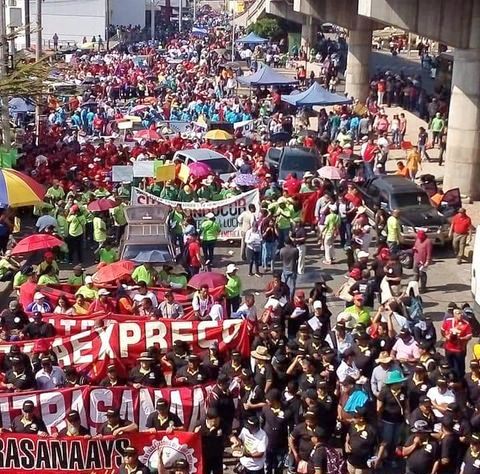
May 1, 2019 march in Tegucigalpa, Honduras.
In recent days the Southern Command has reported the presence of 300 U.S. Marines in the national territory, as well as its military presence in three more countries in Central America: Belize, Guatemala and El Salvador, supposedly to assist the national armed forces in case of natural disasters. Similarly, images of military movements of the Honduran army in different parts of the country have been circulating in alternative media. Rumours and speculation have arisen: some say that "the very gringos will be the ones to take out JOH" because of his links to drug trafficking (taking into account that his brother Tony Hernández is already being tried in a court in the south of New York for trafficking tons of cocaine); others say the military themselves are planning a coup d'état, to avoid being extradited or because the military has been disrespected by the President who has skipped promotions 22, 23 and 24 of the army, placing his close friends and collaborators in the military in the high command.
In Honduras many things could happen; the lessons of the recent days of struggle point to a greater sharpening of the contradictions, especially with the Platform's healthy insistence on continuing the popular mobilization and the enormous support in public opinion and of other important opposition forces in the country. One of the teacher leaders, interviewed in the street, showed a high level of political consciousness in his response when questioned if what they were seeking is the end of the regime: "We are the front of the masses and are fulfilling our role, now the political vanguards need to assume their historic responsibility."
(Translated from the original Spanish by TML. Photos: G. Ríos Munguía, WWSW)
Endless Futile Attempts to Negate Palestinians' Right to Be
Kushner as a
Colonial Administrator:
Let's Talk about the "Israeli Model"
In a TV interview on June 2, on the news docu-series Axios on the HBO channel, Jared Kushner opened up regarding many issues, in which his "Deal of the Century" was a prime focus.
The major revelation made by Kushner, President Donald Trump's adviser and son-in-law, was least surprising. Kushner believes that Palestinians are not capable of governing themselves.
Not surprising, because Kushner thinks he is capable of arranging the future of the Palestinian people without the inclusion of the Palestinian leadership. He has been pushing his so-called Deal of the Century relentlessly while including in his various meets and conferences countries such as Poland, Brazil, and Croatia, but not Palestine.
Indeed, this is what transpired at the Warsaw conference on "peace and security" in the Middle East [on February 13 and 14]. The same charade, also led by Kushner, is expected to be rebooted in Bahrain on June 25.
Much has been said about the subtle racism in Kushner's words, reeking with the stench of old colonial discourses where the natives were seen as lesser, incapable of rational thinking beings who needed the civilized "whites" of the western hemisphere to help them cope with their backwardness and inherent incompetence.
Kushner, whose credentials are merely based on his familial connections to Trump and family friendship with Israeli Prime Minister Benjamin Netanyahu, is now poised to be the colonial administrator of old, making and enforcing the law while the hapless natives have no other option but to either accommodate or receive their due punishment.
This is not an exaggeration. In fact, according to leaked information concerning Kushner's "Deal of the Century," and published in the Israeli daily newspaper, Israel Hayom, if Palestinian groups refuse to accept the U.S.-Israeli diktats, "the U.S. will cancel all financial support to the Palestinians and ensure that no country transfers funds to them."
In the HBO interview, Kushner offered the Palestinians a lifeline. They could be considered capable of governing themselves should they manage to achieve the following: "a fair judicial system, freedom of the press, freedom of expression, tolerance for all religions."
The fact that Palestine is an occupied country, subject in every possible way to Israel's military law, and that Israel has never been held accountable for its 52-year occupation seems to be of no relevance whatsoever, as far as Kushner is concerned.

Preparing to celebrate Land Day and one-year anniversary of the Great
Return March,
March 28, 2019 in Gaza.
On the contrary, the subtext in all of what Kushner has said in the interview is that Israel is the antithesis to the unquestionable Palestinian failure. Unlike Palestine, Israel needs to do little to demonstrate its ability to be a worthy peace partner.
While the term "U.S. bias towards Israel" is as old as the state of Israel itself, what is hardly discussed is the specific of that bias, the decidedly condescending, patronizing and, often, racist view that U.S. political classes have of Palestinians -- and all Arabs and Muslims, for that matter; and the utter infatuation with Israel, which is often cited as a model for democracy, judicial transparency and successful "anti-terror" tactics.
According to Kushner a "fair judicial system" is a condition sine qua non to determine a country's ability to govern itself. But is [the] Israeli judicial system "fair" and "democratic"?
Israel does not have a single judicial system, but two. This duality has, in fact, defined Israeli courts from the very inception of Israel in 1948. This de facto apartheid system openly differentiates between Jews and Arabs, a fact that is true in both civil and criminal law.
"Criminal law is applied separately and unequally in the West Bank, based on nationality alone (Israeli versus Palestinian), inventively weaving its way around the contours of international law in order to preserve and develop its '(illegal Jewish) settlement enterprise,'" Israeli scholar, Emily Omer-Man, explained in her essay "Separate and Unequal."
In practice, Palestinians and Israelis who commit the exact same crime will be judged according to two different systems, with two different procedures: "The settler will be processed according to the Israeli Penal Code (while) the Palestinian will be processed according to a military order."
This unfairness is [a] constituent of a massively unjust judicial apparatus that has defined the Israeli legal system from the onset. Take the measure of administrative detention as an example. Palestinians can be held without trial and without any stated legal justification. Tens of thousands of Palestinians have been subjected to this undemocratic "law" and hundreds of them are currently held in Israeli jails.
It is ironic that Kushner raised the issue of freedom of the press, in particular, as Israel is being derided for its dismal record in that regard. Israel has reportedly committed 811 violations against Palestinian journalists since the start of the "March of Return" in Gaza in March 2018. Two journalists -- Yaser Murtaja and Ahmed Abu Hussein -- were killed and 155 were wounded by Israeli snipers.
Like the imbalanced Israeli judicial system, targeting the press is also a part of a protracted pattern. According to a press release issued by the Palestinian Journalists Union last May, Israel has killed 102 Palestinian journalists since 1972.
The fact that Palestinian intellectuals, poets and activists have been imprisoned for Facebook and other social media posts should tell us volumes about the limits of Israel's freedom of press and expression.
It is also worth mentioning that in June 2018, the Israeli Knesset voted for a bill that prohibits the filming of Israeli soldiers as a way to mask their crimes and shelter them from any future legal accountability.
As for freedom of religion, despite its many shortcomings, the Palestinian Authority hardly discriminates against religious minorities. The same cannot be said about Israel.
Although discrimination against non-Jews in Israel has been the raison d'être of the very idea of Israel, the Nation-State Law of July 2018 further cemented the superiority of the Jews and the inferior status of everyone else.
According to the new Basic Law, Israel is "the national home of the Jewish people" only and "the right to exercise national self-determination is unique to the Jewish people."
Palestinians do not need to be lectured on how to meet Israeli and American expectations, nor should they ever aspire to imitate the undemocratic Israeli model. What they urgently need, instead, is international solidarity to help them win the fight against Israeli occupation, racism, and apartheid.
Ramzy Baroud is a journalist, author and editor of Palestine Chronicle. His latest book is The Last Earth: A Palestinian Story (Pluto Press, London, 2018).
(Palestine Chronicle, June 12, 2019. Photo: Times of Gaza.)
Update on the Situation on the Korean Peninsula
Toronto Meeting on Current Developments in the Struggle for Peace and Reunification
A vibrant and informative public forum was held in Toronto on June 15 to mark the 19th anniversary of the signing of the June 15, 2000 North-South Joint Declaration between the Democratic People's Republic of Korea (DPRK) and the Republic of Korea (ROK), a historic occasion that revitalized the Korean people's movement for national reunification. The forum, organized by the Korean Truth Commission (Canadian Chapter) and the Korean Federation in Canada, featured Professor Kiyul Chung, Director of the 21st Century Institute in Washington DC, Distinguished Visiting Professor at Kim Il Sung University in Pyongyang and a lifelong anti-imperialist, peace activist and champion of the rights of the Korean people.
Philip Fernandez, spokesperson for
the Korea Truth Commission
(Canadian Chapter), welcomed everyone and gave a short
presentation summing up the recent experience of the Korean
people in advancing their national struggle for an independent
and peaceful reunification of Korea. He pointed out that, most
importantly, the future of the Korean nation is in the hands of
the Korean people themselves. He noted that Koreans in both north
and south are taking stands to oppose the continuing U.S.
military occupation and threats of further aggression on the
Korean Peninsula and are strengthening relations among
themselves.
Fernandez then introduced the keynote speaker for the event, Prof. Kiyul Chung, and noted that the Canadian people's relations with Prof. Chung stretch back almost two decades to the historic Korea Truth Commission's International War Crimes Tribunal held in New York on June 23-24, 2001. with this tribunal, he recalled, for the first time a people's tribunal was organized to bring to light the crimes committed by the U.S. armed forces against the Korean people since the U.S. occupation of Korea in 1945 and put on trial successive U.S. government leaders and military commanders for these crimes. Based on the evidence provided, an international panel of jurists found all those indicted guilty of war crimes, crimes against humanity, crimes against peace and genocide against the Korean people, and demanded justice, an apology and compensation for the victims of these atrocities, as well as an immediate withdrawal of all U.S. troops from the Korean Peninsula. A delegation of 60 Canadians participated in that historic event, which was co-chaired by Prof. Chung.
In his thorough presentation to the forum and the discussion that followed, Prof. Chung touched on a number of important themes. These included current relations between the U.S. and the DPRK, relations between the DPRK and the ROK, the shifting geopolitical landscape globally with the rise of China and Russia, and the crisis within the U.S. state where President Trump himself is engaged in battling rival forces within the U.S. administration.
Prof. Chung began by emphasizing that the DPRK has built
a
nuclear deterrent to defend its sovereignty in the face of more
than 60 years of threats of renewed aggression by the U.S.,
including nuclear attack. Prof. Chung noted that U.S. government
policy makers now recognize that the U.S. is no longer able to
act as before with the DPRK and that the U.S. had better prepare
an "exit strategy."
Prof. Chung also noted that the DPRK has signalled that it is no longer interested in speaking with the U.S. state if the latter continues to make outrageous and arrogant demands that the DPRK give up its nuclear defence capacity as a condition of talks. Prof. Chung emphasized that the DPRK's principled defence of its independence and sovereignty, in the face of the most difficult challenges -- such as when the Soviet Union and the Eastern Bloc countries collapsed in 1991, and the DPRK went through the period of the "Arduous March" -- has imbued the people of the DPRK with confidence in their leadership and the conviction that they will prevail against the most severe pressure from the Anglo-American imperialists if they remain steadfast in their principles and Juche outlook.
In speaking to the issue of DPRK-ROK relations, Prof. Chung elaborated how even though the Korean people's "Candlelight Revolution" brought President Moon Jae-in to power, he is blocked in efforts to enhance ROK-DPRK relations because the pro-U.S. anti-communist forces are still in control of the main structures of the state including the military, which is an expression of the U.S. domination and control of the country since the Second World War. These forces continue to be supported by the U.S. as their proxies in keeping the Korean people divided and the Korean Peninsula in a state of crisis. For example, despite the terms of the Panmunjom Declaration signed between Chairman Kim and President Moon on April 27, 2018, which calls for both sides to refrain from military provocations against each other, among other pledges, U.S.-ROK joint military exercises continue to be held in violation of the Panmunjom Declaration.
Another of the main themes of the presentation was the rise of China and a revitalized Russia in global geopolitical affairs. Prof. Chung noted that recently both President Xi of China and President Putin of Russia have drawn closer to the DPRK and are lending support in various ways. Both China and Russia emphasize that the only solution to the Korea question is through diplomacy and not through war. Besides sending foodstuffs and other necessities to the DPRK, Russia under Putin has forgiven the $10 billion loan incurred by the DPRK before the collapse of the Soviet Union. As the power and prestige of both Russia and China increase, they will continue to neutralize the U.S. and its attempt to dominate the East Asia region, Prof. Chung stated.
Prof. Chung also spoke on the matter of the brutal UN Security Council sanctions against the DPRK. These illegal sanction have caused great hardship for the people, he said, and must be ended. He noted that globally more than 52 countries have defied the sanctions regime and others have stepped up their assistance to the DPRK. He mentioned in particular the recent rice shipment sent by the people and government of Vietnam to assist in alleviating the food shortage in the DPRK.
A significant part of Prof.
Chung's presentation focused on
the political crisis within the U.S. and the Trump
administration's difficulties and challenges dealing with the
powerful establishment behind the U.S. government -- what he
referred to as the U.S. Military Industrial Complex (borrowing the term
coined by U.S. President
Eisenhower). He gave his
opinion that President Trump's seeming willingness to engage with
the DPRK and build on a friendly relationship with Chairman Kim
Jong Un, manifest at the historic first DPRK-U.S. Summit in
Singapore on June 12, 2018 and the subsequent Hanoi Summit
between the two leaders on February 27-28, 2019, was being
undermined by warmongers U.S. National Security Advisor John Bolton
and U.S. Secretary of State Mike Pompeo, who are operating on an
agenda to subdue the DPRK.
In the face of these complexities, Prof. Chung concluded, the DPRK has continued to uphold its stature in the world community as a sovereign independent state. Besides building its legitimate defence capacity, he said, the DPRK is establishing principled fraternal relations with the ROK and other friendly nations, including China and Russia, in order to advance its development on the basis of mutual interests.
The participants at the meeting highly appreciated Prof. Chung's insights and opinions. In concluding the forum, the spokesperson for the Korea Truth Commission (Canadian Chapter) thanked Prof. Chung, wishing him continued success in the important work he is doing and said he looks forward to his next visit to Canada to continue the discussion.
State Visit of Chinese President to Democratic People's Republic of Korea
Xi Jinping, General Secretary of the Central Committee of the Communist Party of China (CPC) and Chinese President, paid a state visit to the Democratic People's Republic of Korea (DPRK) from June 20 to 21, at the invitation of Kim Jong Un, Chairman of the Workers' Party of Korea and Chairman of the State Affairs Commission of the DPRK. This was the fifth meeting between the two leaders and Xi's first state visit to the DPRK.[1] The visit took place on the 70th anniversary of the establishment of China-DPRK diplomatic ties.
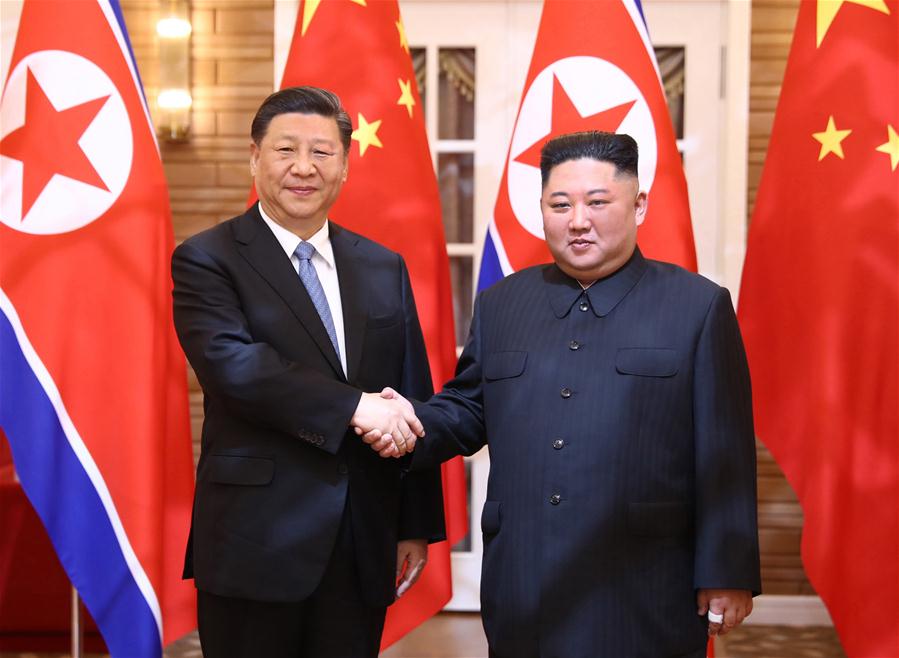 Song Tao, head of the
International Department of the CPC
Central Committee, noted at a June 17 press briefing that in
those 70 years, the two parties and countries have cooperated and
held exchanges on the fields of culture, education, science and
technology, sports and the economy. He pointed out that the CPC
and the Chinese government have stayed committed to the
China-DPRK ties since the 18th CPC National Congress in 2012. The
recent meetings have permitted the exchange of
in-depth views on bilateral ties and the situation on the Korean
Peninsula and reaching a series of important consensuses, Song stated.
This
has opened a new chapter for China-DPRK relations Song said. Both
sides have agreed that it is in the interests of the two
countries and peoples to safeguard, consolidate and develop
bilateral relations, he added. It should also be remembered the
important role played by the Chinese People's Volunteer Army
fighting on the side of the DPRK during the Korean War, with some
three million Chinese people eventually serving in the war.
Today, some 200,000 Chinese tourists visit the DPRK every year,
many of them to visit battlefields of the Korean War where their
family members fought.
Song Tao, head of the
International Department of the CPC
Central Committee, noted at a June 17 press briefing that in
those 70 years, the two parties and countries have cooperated and
held exchanges on the fields of culture, education, science and
technology, sports and the economy. He pointed out that the CPC
and the Chinese government have stayed committed to the
China-DPRK ties since the 18th CPC National Congress in 2012. The
recent meetings have permitted the exchange of
in-depth views on bilateral ties and the situation on the Korean
Peninsula and reaching a series of important consensuses, Song stated.
This
has opened a new chapter for China-DPRK relations Song said. Both
sides have agreed that it is in the interests of the two
countries and peoples to safeguard, consolidate and develop
bilateral relations, he added. It should also be remembered the
important role played by the Chinese People's Volunteer Army
fighting on the side of the DPRK during the Korean War, with some
three million Chinese people eventually serving in the war.
Today, some 200,000 Chinese tourists visit the DPRK every year,
many of them to visit battlefields of the Korean War where their
family members fought.
The DPRK's ties with China in fact go beyond the 70
years. In
his youth, Kim Il Sung, founder and President of the DPRK, was a
important leader in China's guerrilla forces fighting against the
Japanese occupation of Manchuria in the 1930s and '40s. The
Korean people were united with the Chinese in this struggle, as
Korea was also suffering terribly under Japanese occupation at
that time.
The DPRK is an important bulwark against U.S. imperialist aims because of its geographic location and the steadfast defence of its sovereignty and the cause of peace and national reunification. It is in the mutual interest of China and the DPRK that the latter continue to play this role.
In this regard, in the recent period, China has sought to renew and deepen its longstanding ties with the DPRK, particularly with respect to the role China can play in fostering dialogue between the DPRK and the U.S. China can play an important role at a time when the current U.S. administration is undermining negotiations and blocking the path to the signing of a peace agreement to formally end the Korean War and permit the normalization of relations, including the lifting of the unjust sanctions against the DPRK. Throughout the past year-and-a-half of discussions and negotiations between the DPRK and U.S., China has consistently called for dialogue to resolve differences between the two sides, and that mutual trust be built through a reciprocal process of action-for-action.
Song stated that China and the DPRK have agreed to encourage the parties concerned "to cherish the hard-won momentum of dialogue and alleviation of tension on the peninsula, stick to the goal of denuclearization, safeguard the peace and stability on the peninsula, and solve the Korean Peninsula issue through dialogue and consultation," Xinhua reported.
In a letter published in DPRK media on June 19, President Xi reiterated the importance China ascribes to its relations with the DPRK and its willingness to contribute to the DPRK's efforts to secure peace for the region. "As a good comrade and neighbour, no matter how the international situation changes, the CPC and the Chinese government have held and will always hold a firm position on consolidating and developing China-DPRK relations," Xi wrote.
China will unswervingly support Chairman Kim in leading the DPRK to implement the new strategic line and focus on developing the economy and improving people's livelihood for new and greater achievements in the socialist construction of the DPRK, Xi added.
"We are pleased to see that with Chairman Kim's correct decision and the concerted efforts of all parties concerned, the general trend of peaceful dialogue on the Korean Peninsula has taken shape, and a political settlement to the Peninsula issue sees a rare historical opportunity, which has been universally recognized and anticipated by the international community," he said.
Xi voiced China's readiness to work together with the DPRK for the realization of lasting peace and stability in the region, saying, "We need to strengthen strategic communication and promote exchanges and mutual learning, to endow our traditional friendship with new meaning." He called on the two sides to carry on their good tradition of high-level exchanges and plans to further develop bilateral ties.
Both sides should enhance communication and coordination at all levels, and deepen inter-party communication and exchanges on governing experience, Xi added.
Making progress in securing regional peace and stability, the two countries need to deepen communication and coordination, Xi said. "It fits our respective need for development and the common interests of our peoples to push forward the political settlement of the Korean Peninsula issue and maintain peace and stability in the region," he added. China will "actively contribute to regional peace, stability, development and prosperity by strengthening communication and coordination with the DPRK and relevant parties to jointly push for progress in talks and negotiations on the issue," he added.
Prior to Xi's visit to the DPRK, Xinhua published an item that included notable quotes from Xi regarding the situation on the Korean Peninsula and the DPRK's peace negotiations with the U.S.:
"China will, as always, support the amelioration of inter-Korean relations and facilitate reconciliation and cooperation between the two sides.
"China stands ready to work with the DPRK and relevant parties to play a positive and constructive role in maintaining peace and stability and realizing denuclearization on the peninsula and lasting peace and stability in the region.
"China supports the DPRK's continued adherence to the direction of denuclearization on the peninsula, supports the continuous improvement of inter-Korean relations, supports the DPRK and the United States holding summits and achieving results, and supports relevant parties resolving their respective legitimate concerns through dialogue."
On June 20, President Xi was warmly welcomed to
Pyongyang by
throngs of people. He and Chairman Kim agreed "to work together
to create a bright future of inter-party and inter-state
relations at a new starting point in history," Xinhua reported.
The China-DPRK friendship is a strategic choice made by the two
sides with a long-term and overall perspective and will not waver
due to changes in the international situation, Xi said. He went
on to reiterate his prior statements regarding the importance
China accords to its relations with the DPRK and its commitment
to deepening them.
Though a small country, the principled stand of the DPRK to always defend its sovereignty against foreign aggression, despite all the attempts to turn truth on its head to isolate and vilify it as the aggressor, is a rallying point. The visit of President Xi to the DPRK shows how it creates the possibility for others to join with the DPRK for mutual benefit, including defending the cause of peace that is in the interest of all humanity.
Note
1. The four prior
meetings between President Xi and Chairman Kim were all in China.
The first was in Beijing from March 25-28, 2018. The second
meeting was on May 7-8, 2018 followed by another in Beijing on June
19-20, 2018. The fourth meeting came on January 7-10 this year.
(Photos: Xinhua)
|
|
(To access articles individually click on the black headline.)
Website: www.cpcml.ca Email: editor@cpcml.ca

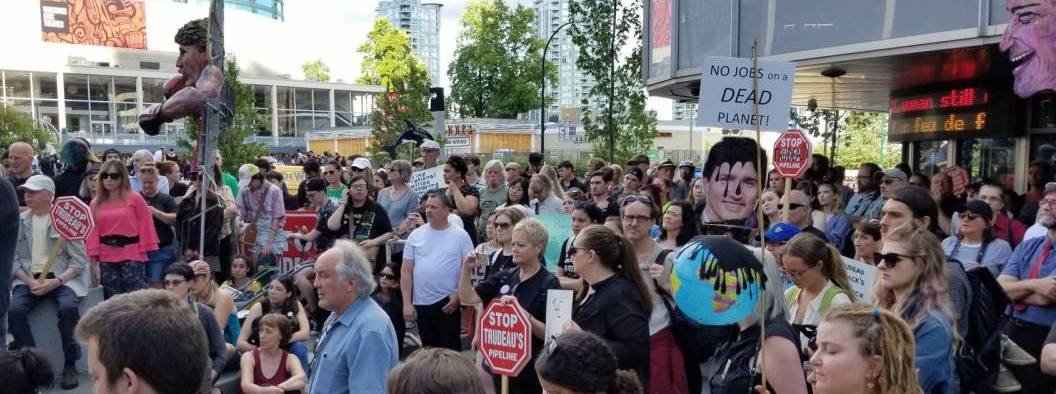

 The Trudeau government says
it will eventually sell Trans
Mountain Corporation back to the private sector, in particular
to Indigenous investors, but first the operation must be
"de-risked." For now, the SOE will reportedly run at a loss given
the low tolls to be charged to transport oil and the huge amount
invested in buying the existing pipeline and expanding it. The
CEO of Trans Mountain even publicly warned investors, including
Indigenous investors, to wait until the expanded pipeline is
built and operational, and tolls can be increased and the
investment "de-risked."
The Trudeau government says
it will eventually sell Trans
Mountain Corporation back to the private sector, in particular
to Indigenous investors, but first the operation must be
"de-risked." For now, the SOE will reportedly run at a loss given
the low tolls to be charged to transport oil and the huge amount
invested in buying the existing pipeline and expanding it. The
CEO of Trans Mountain even publicly warned investors, including
Indigenous investors, to wait until the expanded pipeline is
built and operational, and tolls can be increased and the
investment "de-risked."
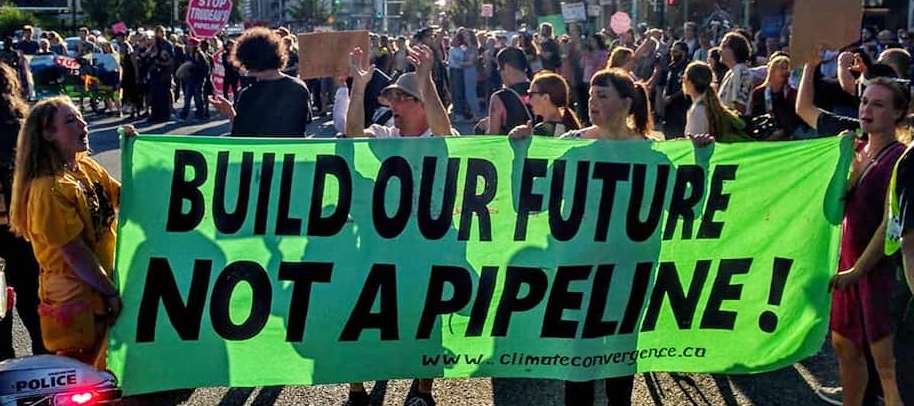
 The Prime Minister said,
"We have a responsibility to ensure
that the decisions we make today move us toward a cleaner,
sustainable economy. Major resource projects can move forward,
but only if we do so in a way that protects the environment and
respects Indigenous rights. The TMX project is a significant
investment in Canadians and in Canada's future that will create
thousands of good, middle class jobs, maintain the highest
environmental standards, and fund the clean energy solutions that
Canada needs to stay competitive on the global stage."
The Prime Minister said,
"We have a responsibility to ensure
that the decisions we make today move us toward a cleaner,
sustainable economy. Major resource projects can move forward,
but only if we do so in a way that protects the environment and
respects Indigenous rights. The TMX project is a significant
investment in Canadians and in Canada's future that will create
thousands of good, middle class jobs, maintain the highest
environmental standards, and fund the clean energy solutions that
Canada needs to stay competitive on the global stage." Questions abound. Is this
socially responsible stewardship of
the environment? Where does the right arise and reside to sell
the earth and its non-renewable oil and gas? Many Indigenous
peoples have not given their consent to the TMX. People concerned
with the health of Mother Earth decry the TMX as backsliding on
Canada's commitments to reduce greenhouse gas.
Questions abound. Is this
socially responsible stewardship of
the environment? Where does the right arise and reside to sell
the earth and its non-renewable oil and gas? Many Indigenous
peoples have not given their consent to the TMX. People concerned
with the health of Mother Earth decry the TMX as backsliding on
Canada's commitments to reduce greenhouse gas.